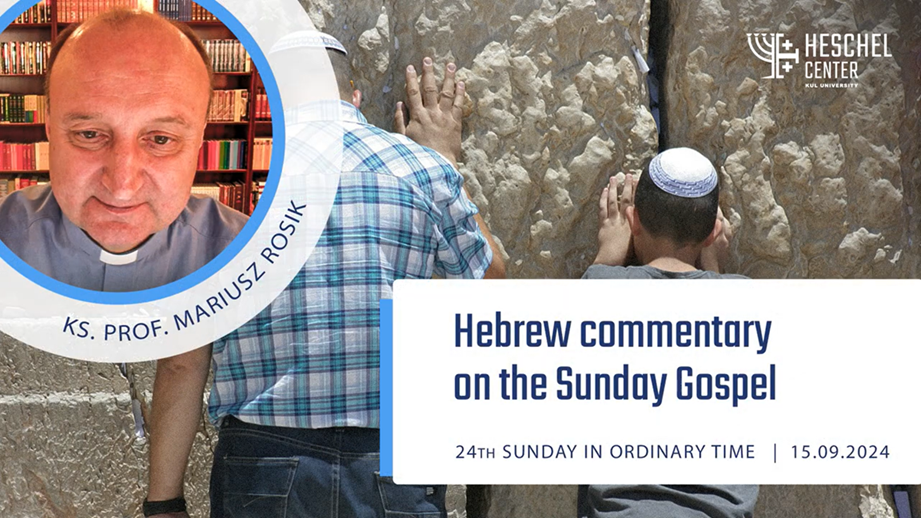“Jesus with his views fits fully into one of the Judaic trends of the Messianic tradition. The relationship between Judaism and Christianity is much stronger than it has been thought until recently”, stresses Rev. Prof. Dr. Mariusz Rosik, biblical scholar, in his commentary for the Catholic University of Lublin Heschel Center for the Sunday, September 15.
When Israelites lost their independence after the invasion of Babylonians in 586 BC, a period in which the Jews virtually did not have their own independent state began. It lasted for twenty-six centuries except for the relatively short time of the rule of the Hasmonean dynasty. At the time when Jesus started His public activity, national and liberation movements among the Jews, who were then under the occupation of Rome, proved to be particularly strong. These hopes were to be fulfilled by the expected Messiah.
In recent years the voices of those who acknowledge the presence of the idea of the suffering Messiah in Jewish theology as early as in the first century BC have become more audible. In 2000, the Jewish theologian I. Knohl published a book entitled The Messiah Before Jesus: The Suffering Servant of the Dead Sea Scrolls (Jerusalem 2000). According to the professor at the Hebrew University of Jerusalem the idea of the suffering Messiah was present in the views of the members of the Qumran community. The author proves his thesis, supporting it not only with the Dead Sea Scrolls, but also rabbinic literature which – although created in the Christian era – is the reflection of earlier beliefs, existing for decades or even centuries.
I. Knohl’s views seem to be confirmed in a record preserved on a stone stele, coming from Jordan, found in 2008 and today known as the Gabriel’s Revelation. David Jeselsohn, a connoisseur and admirer of antiquity, acquired this almost one meter long stone at an antiquity market. After bringing it to Europe, he decorated the interior of his homestead with it. Ada Yardeni, an expert on the Hebrew language of Herod’s time, took an interest in this artefact. Not hiding her surprise, she announced to her friend: ‘You’ve got Qumran Scrolls written in stone!” What was new was the fact that the inscription was not forged or engraved, but was written in ink. Studies confirmed its ancient origin. What is more, it is almost certain that the tablet came into existence several years before the birth of Christ, probably at the beginning of the second half of the first century BC. And this is what makes the finding so significant.
It is highly probable that the inscription expresses the idea of a suffering Messiah who will rise from the dead or will demonstrate a “sign” after three days[1]. One of its lines reads: “In three days you will know that evil will be defeated by justice,” and then words appear that are attributed to the Archangel Gabriel and addressed to the Messiah: “In three days you shall live[2]. I Gabriel command you.” Precisely speaking, this announcement is addressed to “Prince of princes,” but after all the Messiah was sometimes described in exactly that way.
Jesus with his views fits fully into one of the Judaic trends of the Messianic tradition. The relationship between Judaism and Christianity is much stronger than it has been thought until recently.
[1] Israel Knohl says: “The Christian myth of a Messiah who dies and is resurrected was shaped by a pre-existing Jewish myth. From the ‘Gabriel Revelation’ we learn that the motif of the leader’s resurrection on the third day existed in Judaism prior to the birth of Christianity”; I. Knohl, The Gabriel Revelation, in: The Dead Sea Scrolls and Contemporary Culture. Proceedings of the international conference held at the Israel Museum, Jerusalem (July 6–8, 2008), ed. A.D. Roitman [and others], Leiden 2011, 441.
[2] The second possible version of reading the inscription: “After three days – a sign”; T. Elgvin, Eschatology and Messianism in the “Gabriel Inscription”, 5-6.
About the Author:
Rev. Prof. Dr. Mariusz Rosik – biblical scholar, professor of theological sciences, director and research, and didactic employee of the Institute of Biblical Sciences at the Pontifical Faculty of Theology in Wroclaw, Poland. He specializes in the theology of the New Testament, exegesis of the Synoptic Gospels, and ancient Jewish history. Author of numerous scientific, popular science, and pastoral publications.










